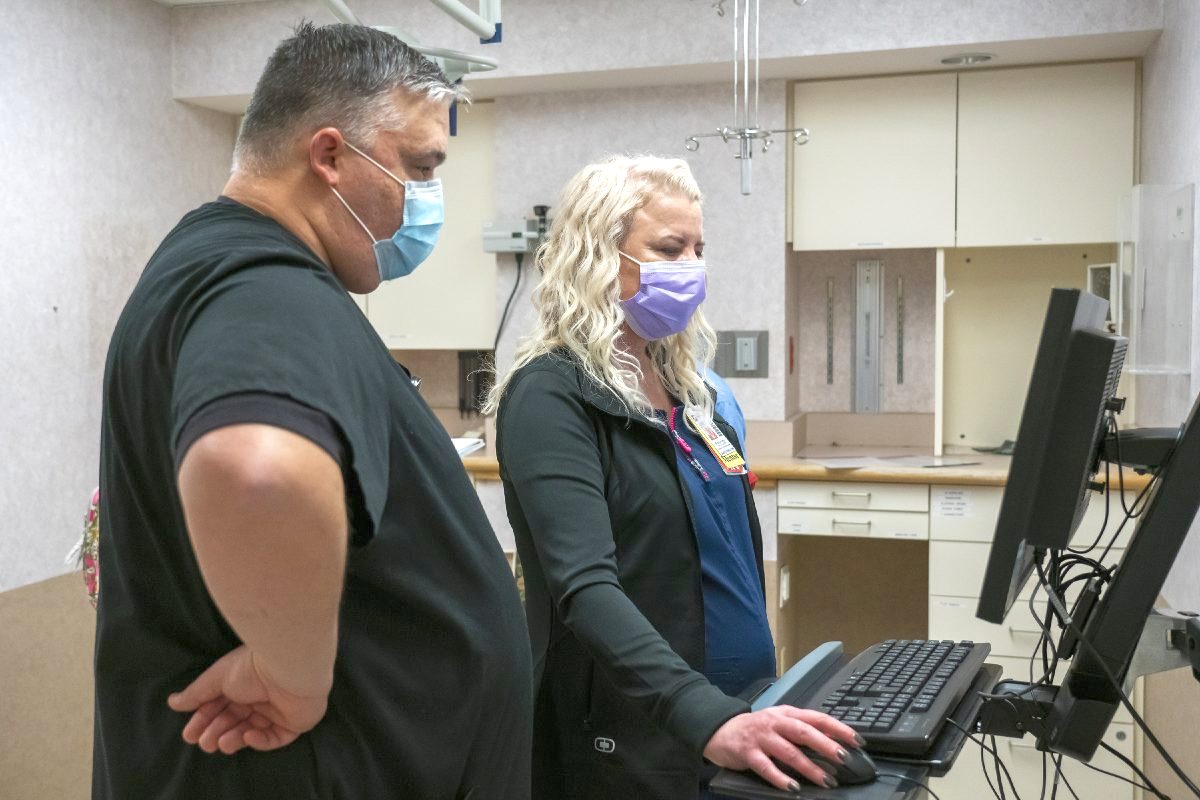Unmasked time spent with family landed a Johnson Memorial Hospital nurse in his own critical care unit.
Now, he warns others to not make the same mistake of unmasking with people outside their household.
Brent Shepherd, the hospital’s disaster preparedness coordinator and a registered nurse in the hospital’s cardiac testing center, had spent months making sure the hospital was prepared for the worst during the pandemic. But those preparations only go so far when employees are off the clock, he said.
[sc:text-divider text-divider-title=”Story continues below gallery” ]
Click here to purchase photos from this galleryShepherd believes he caught COVID-19 from interacting with family members who were caring for a sick relative. Shepherd and others took turns taking the relative to doctor’s appointments and helped with chores and shopping, but didn’t mask up while they were doing it because they thought they were being careful enough in their daily lives, he said.
“Somewhere along the line somebody got it and everyone started having symptoms the same day. When we were together no one had symptoms,” Shepherd said. “It just happens. You can do everything to prepare and it just takes one time and you catch it.”
According to the Centers for Disease Control and Prevention, the virus is most commonly spread through close contact with others. The risk goes up when you’re within six feet of others while doing activities such as speaking, singing, coughing or sneezing, all of which result in respiratory droplets being released, the CDC says.
Though it is too late for his family, Shepherd asks others to take precautions around loved ones outside their immediate household.
Family members, including Shepherd’s wife, had a fairly easy time with mild, moderate or no symptoms.
That wasn’t the case for him.
His wife caught it first and reported sinus infection-like symptoms that cleared up fairly quickly.
Shortly after Shepherd developed his first symptoms — a persistent headache, gastrointestinal issues and loss of taste and smell — he took a COVID-19 test and started taking vitamins and doing exercises throughout the day to boost his immune system.
“I was confident I would get over it quickly. My wife and everyone I knew had gotten over it quickly. But I do know it ranges from having a little bit of symptoms to no symptoms and being in the hospital 5 days, 8 days or a week, to not being able to leave the hospital,” Shepherd said. “Knowing all of that, I did what I could do to fight it off.”
A few days later he started coughing, felt fatigued and had a fever.
Within a week, the disease caused by the virus made him so tired he couldn’t walk across the room. His oxygen level dropped to 88% at rest. A normal oxygen level is about 95%, according to the Mayo Clinic.
“It got to where I couldn’t walk across the room. If I did anything, I’d have to lay down for a half-hour just to get my strength back,” Shepherd said. “After being so weak for three or four days, I decided to call the ambulance because I knew I wouldn’t be able to make it from the car into the ER without help.”
At the hospital, Shepherd knew exactly what to expect.
Like they had done so many times before, doctors and nurses treated Shepherd with the now tried and true treatments of Remdesivir, steroids, Vitamin C and Zinc.
“I truly believe it was that combination of treatments and the care that I got that got me out of there,” Shepherd said.
The level of care he knew his colleagues would give led Shepherd, a Greenwood resident originally from Indianapolis, to seek care at the Franklin hospital.
“I knew that the COVID unit is so well-rehearsed. They have been doing this over and over for months,” he said.
Shepherd was out of work for a month battling the virus and recovering his strength. He returned to work last week to see patients and help with the first round of vaccinations.
Due to the short supply, health care workers such as Shepherd who have had COVID-19 in the last few months are behind those who haven’t been infected. In the meantime, he will advocate for the vaccine to anyone who will listen, he said.
“It doesn’t matter who you are (or) how healthy you are, you can catch COVID if you don’t take the proper precautions everywhere you go,” Shepherd said. “I would recommend everyone get the vaccine so they don’t have to go through what I went through.”
The first week back at work went smoothly. But Shepherd, like many who have recovered, was more easily fatigued.
Due to his own close call, he warns how quickly the virus can spread through a family or any group of people, no matter their risk factors. Even if most get mildly ill, the disease has an unpredictable impact that doesn’t fit into a singular risk category, he said.
“A healthy person can get sick and die, or an unhealthy person can get mild symptoms and get over it quickly,” Shepherd said. “It impacts everyone differently.”





